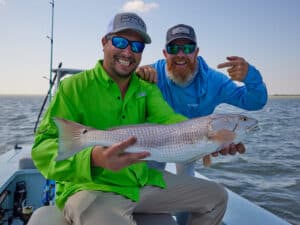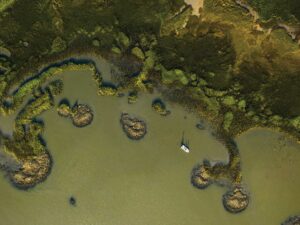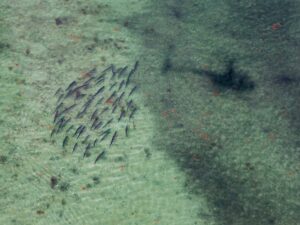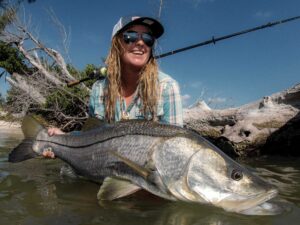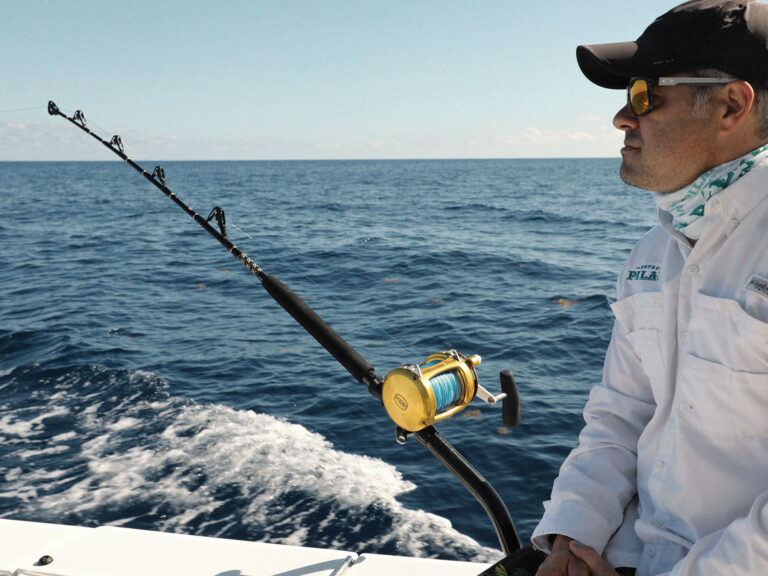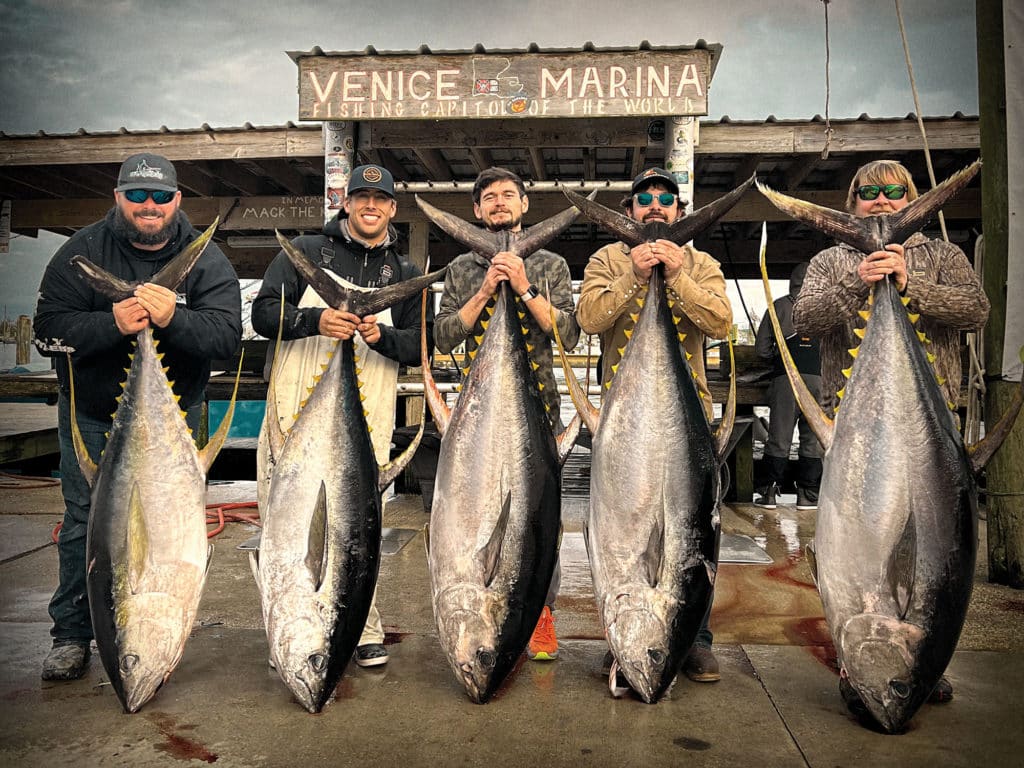
The most reliable place on the planet to catch yellowfin and blackfin tunas is offshore Venice, Louisiana. Venice is located advantageously at the mouth of the mighty Mississippi River. And as fall turns to winter, Gulf of Mexico lump fishing is what it’s all about. How good is it?
“We had a day when we quadrupled on the very first set,” says Capt. Joey Davis of Relentless Sportfishing. “We got all four fish over the rail, and they were all 130 pounds or over. Our biggest fish last year weighed 216 pounds.”
The Lumps Explained
Why do blackfins, yellowfins and wahoo gravitate toward these specific deepwater structures in the winter?
The Midnight Lump, also labeled the Sackett Bank on some marine charts, is the top of a large underwater mountain that comes within a couple hundred feet of the surface. To get there, run about 50 miles southwest of the Louisiana coast.
The combination of shallow water (depth ranges between 200 and 250 feet) and large schools of baitfish that get caught in nearby currents is what makes fishing on the Lump so great. The underwater, mountainous paradise serves as a major feeding location. Some of the largest wahoo and tuna on Earth aggregate here to feed.
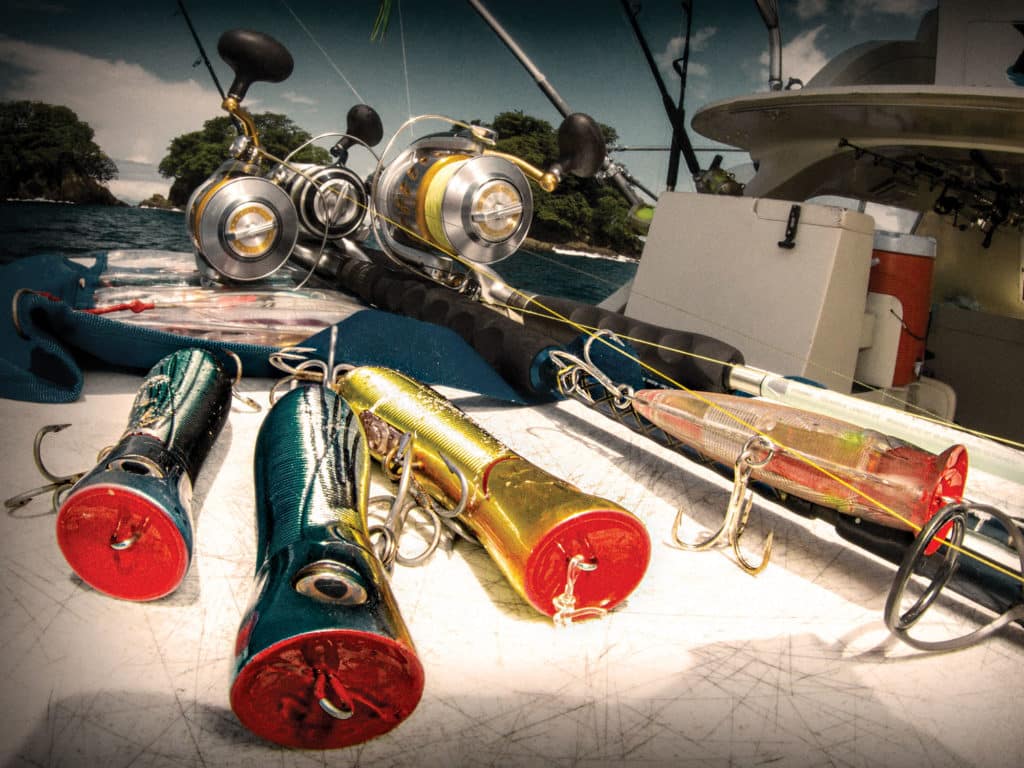
Historically, the Midnight Lump has been the most targeted area near Venice. It was relatively normal to see hundreds of boats fishing within a relatively small 2.9-square-mile area.
The Lump contributed seven of the top 10 yellowfins landed in Louisiana, including the state record, points out John Felsher, an outdoor writer. On March 18, 2005, Anthony Taormina caught a 240.3-pound yellowfin while fishing at the Midnight Lump aboard a charter boat captained by Scott Leger. Taormina’s fish beat the existing state record, a 235-pound yellowfin landed by Tom W. Moughon on the Midnight Lump in 2004.
“Probably 90 percent of the biggest yellowfins caught off Louisiana are caught on the Midnight Lump,” says Capt. Hunter Caballero, of Paradise Outfitters in Venice, who served as the first mate on the boat when Taormina landed his big fish. “We’ve had days where we stopped at 18 tuna, but we could have put many more in the boat. We’ve caught 197-, 194- and 160-pounders on the same day.”
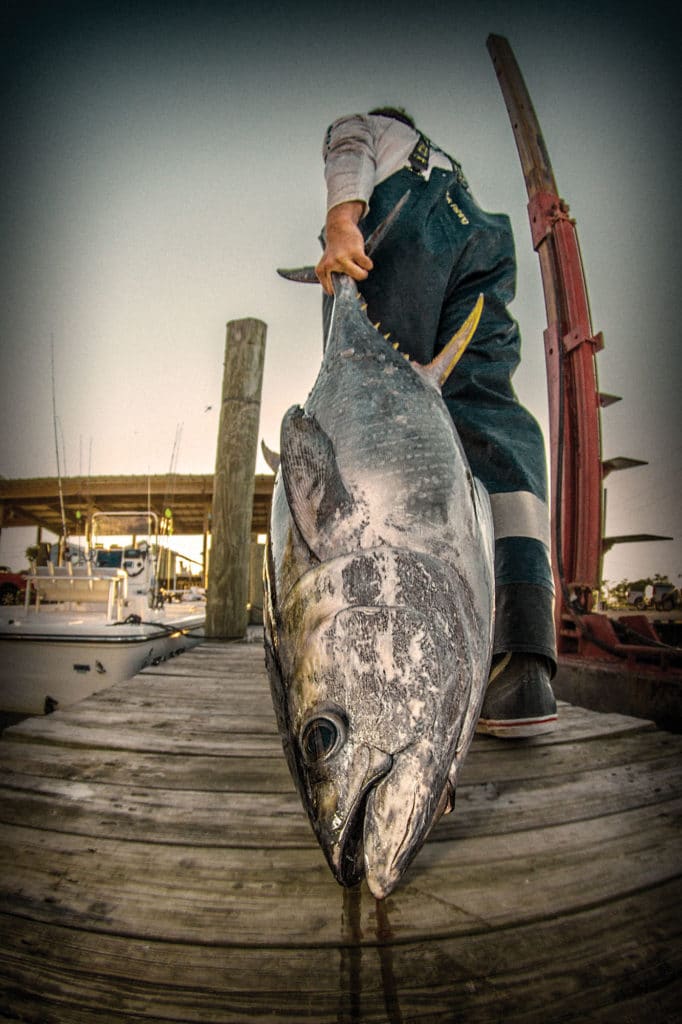
In With the New
However, times have changed.
“The fishing is better on the lumps toward the east now,” says Peace Marvel, a legendary Venice charter-boat captain. “It’s the same structure—salt domes. We’re talking blackfins, yellowfins and wahoo mostly, but there are a ton of sharks too, if that’s what you’re into.”
Boating winter tuna on the lumps, however, is not so much a battle as it is a quest. Tuna will break your spirit, especially in this size.
During the dog days of summer, it’s typical for tuna to take a deep dive to the bottom as soon as they are hooked—and the bottom can be hundreds of feet. Not that it’s an easy fight, but it is somewhat predictable. Because the lumps are relatively shallow, however, hooked tuna don’t so much dive as they streak away from the boat. Anglers should expect an entirely different fight.
“It’s a heck of a lot more reeling,” Davis says. “And when you’re talking about fish of this size, it’s not a short or simple fight.”
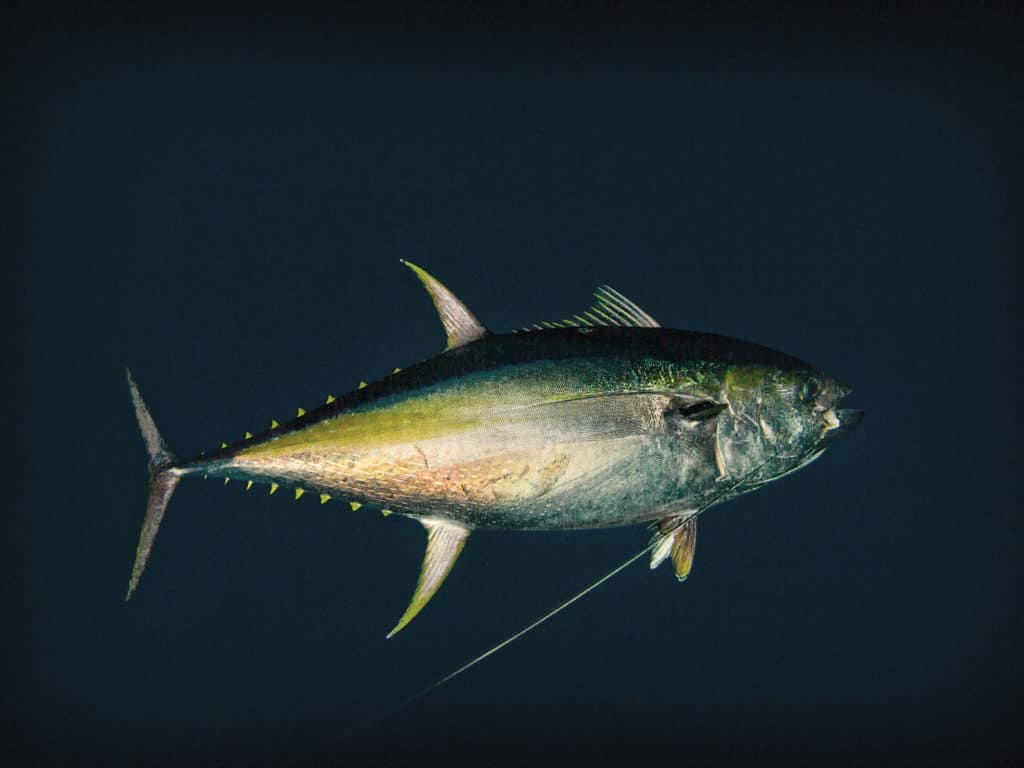
Chum at the Lumps
Davis details one of the best ways to fish the Gulf lumps:
“Up-current, we set up with four or five rods and drift,” he says. “We chum with chunks and fish both live baits and chunks. Small hooks do the best.”
When Gulf currents hit the sides of the formation, water pushes plankton toward the surface. Plankton attracts baitfish. Concentrations of tasty baitfish attract big predators such as yellowfin tuna, blackfin tuna, wahoo, cobia, king mackerel and sometimes billfish such as blue marlin, white marlin or sailfish.
“Fish go where they can eat,” Marvel says. “The Lump was hammered really hard every day for several years. In the past couple years, the Lump hasn’t produced the numbers of tuna, but it still produces many big tuna. We’ve caught an insane amount of 200-pound fish. The biggest one to come on my boat since the oil spill (of April 2010) weighed 214 pounds. That was in October 2010, a couple months after the spill.”
Read Next: How to Catch Tuna
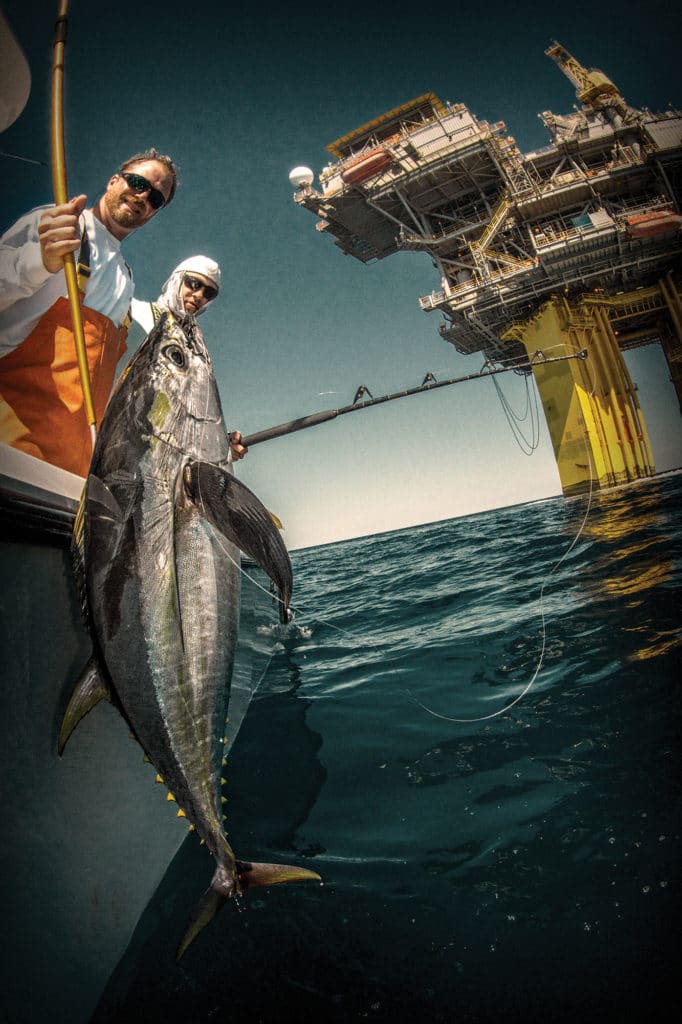
The Other Tuna
Lump fishing can be either feast or famine, according to Capt. Chris Moran. “Some days, catching even one fish is a great day. After a sluggish day on the Lump, what the customers need is some action and excitement.”
One of Moran’s favorite ways to provide a boost to morale is his kamikaze style of chasing blackfin tuna in open water. The fishing is action-packed and fun for the customers, plus it can be surprisingly effective.
“I keep some smaller spinning reels handy, and I’ll run along until we see the blackfins jumping,” he says. “Then I run straight at them and cast small plastics such as Tsunamis, Calcutta Flash Foils or Yo-Zuri poppers into the school.”
Veteran tuna angler Marc Amos described it best. “I don’t really care whether they go down or run out on a straight line,” he says. “Tuna of any color will flat out kick your ass, period.”
A Bucket-List Yellowfin Tuna
It was the year of the space shuttle Columbia tragedy. Lump season was about over, but the big fish were still there. The weather was not cooperating and blowing 25 out of the south. After suggesting that we reschedule several times, my clients decided to give it a go. We eased out of Southwest Pass, and finally made it to the Lump after about two hours. Coyote, a commercial boat out of Florida, called me on the radio and told me it had big tuna in its chum. The crew suggested I get in behind them. It was rough out there, and I was thankful for the help.
We dumped some pogies. Six big yellowfins showed up almost immediately. I grabbed a rod, threaded a pogy on a circle hook, and dropped it in the slick. The biggest of the six came from under the boat and ate the pogy, and I loosened up the drag. The fish made a blistering surface run as soon as it felt the hook, and we could see it in the waves. It was one of the coolest things I’ve ever seen.
After about 30 minutes, the fish just quit fighting. I assumed a mako had hit its tail, but 20 minutes later we got him to gaff and the fish had just died. That’s the only time that’s ever happened to me. When we got it on deck, I told the crew that it was the biggest yellowfin I’d ever caught and we needed to get it on a scale. The fish ended up weighing 213 pounds back on solid ground.
On the way back in, I asked the crew why they had to absolutely fish that day. They asked me if I’d heard about the space shuttle disaster. I told them I had been fighting a fish on the Lump when it happened and heard about it over the radio. The group told me they had found some debris from the shuttle and sold it on eBay. Apparently, that was illegal and they got arrested. Out on bail and not sure if they were going to be convicted, they were getting as many bucket-list items checked off as possible before their trial. —Capt. Devlin Roussel

